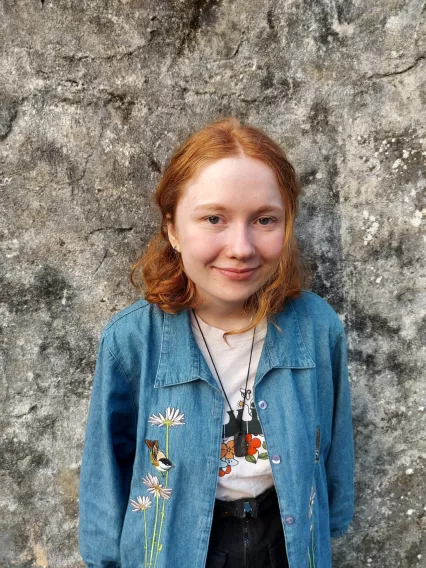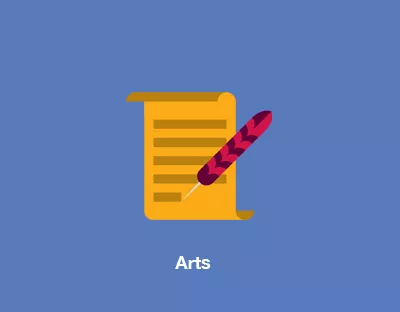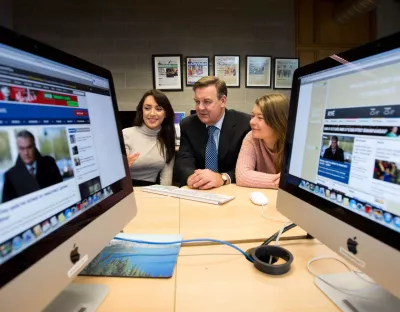Key Info
English can be taken as part of the UL Arts Degree as a joint honours combination. Review the subjects you can study with English by looking at the table on the BA Arts course page.
About you
Above all else, you love to read: novels, poetry, non-fiction, drama, magazines. You want to give yourself the time and opportunity to read great books and to learn more about English literature. You want to engage with narratives that help us to understand ourselves and the world we live in. You want to know more about culture in the broadest sense. You love film and music and you want to understand how these art forms relate to fiction, drama, and poetry. You are creative, love to write, and you want to express yourself as eloquently and effectively as possible. You are open to new ideas and to the power of words and images to inform, influence, and convince.
Why study English at UL?
Our English programme enables you to develop critical thinking skills through an appreciation of the wide world of literature in English, and by analysing the social and historical contexts through which that literature emerged. You will learn about the art of writing and shaping narrative by exploring literary genres and history from the 700s on. You choose electives to suit your own interests, in Irish, British, American, and world literatures, and in gender and sexuality studies among other specialist topics.
Learn more about our courses and upcoming events
What you will study
English at UL has four main components that run throughout the four years of the programme:
- Literary analysis and theory, critical practice;
- Historical schools/eras in literature (e.g. Early Modern Literature; Augustan and Romantic Literature; Victorian Texts and Contexts; Literary Modernism and Postmodernism; Old and Middle English Literature);
- Specialist electives in Irish Literature (e.g. Gothic Literature in Ireland; Irish Literary Revolutions 1880-1930; Irish Literature 1930-1990; Study of a Major Irish Author; Contemporary Irish Literature);
- Specialist electives in Creative Writing and in World Literatures (e.g. American Literature; Contemporary African Literature; Postcolonial/Postcolonial Literature in English; Contemporary Women’s Writing).
More information on the study of English can be found on the School of English, Irish, and Communication page.
English Pathway Joint Honours
Modules are subject to change
| Year 1 | Semester 1 | Semester 2 | |
| EH4141 | English Literature 1: Novels and Short Fiction | EH4022 | English Literature 2: Early Modern Poetry and Plays |
| Year 2 | Semester 3 | Semester 4 | |
| EH4003 | Introduction to Literary Theory | Cooperative Education Work Placement | |
| Students Select 1: | |||
| EH4053 | Augustan and Romantic Literature | ||
| EH4023 | The New World: American Literature to 1890 | ||
| EH4043 | Irish Literary Revolutions 1880-1930 | ||
| EH4121 | Gothic Literature in Ireland | ||
| Year 3 | Semester 5 | Semester 6 | |
| Erasmus/Exchange placement with a partner institution abroad | EH4006 | Victorian Texts and Contexts | |
| Students Select 1: | |||
| EH4016 | State of the Union: American Literature since 1890 | ||
| EH4026 | Colonial/Postcolonial Literature in English | ||
| EH4036 | Irish Literature 1930-1990 | ||
| Year 4 | Semester 7 | Semester 8 | |
| EH4007 | Literary Modernism | Students Select 2: | |
| Students select 1: | EH4018 | Contemporary Irish Literature | |
| EH4028 | Study of the Major Irish Author | EH4026 | Colonial/Postcolonial Literature in English |
| EH4017 | Contemporary African Literature in English | EH4038 | Study of a Major Author |
| EH4027 | Contemporary Women's Writing | EH4008 | British Literature 1945-Present Day |
| EH4037 | Introduction to Creative Writing | EH4125 | Feminist Theory and Literary Texts |
How to apply
| Where are you applying from? | How to Apply |
|---|---|
| Ireland | Irish students must apply to UL via the CAO. |
| The UK | Students who have completed their A-Levels can apply to UL via the CAO. More information can be found on the Academic Registry website. |
| The EU | EU Students can apply to UL via the CAO. More information can be found on the Academic Registry website. |
| Non-EU country | If you are outside of the EU, you can apply for this subject through the Bachelor of Arts degree. |
Fees and funding
Student course fees are broken into three components - Student contribution, Student Levy and Tuition Fees.
A number of illustrative examples of fees for this course based on the current fee levels have been set out in the tables below.
An explanation of the components, how to determine status and the criteria involved is provided below the examples as is a list of possible scholarships and funding available.
EU Students with Free fees status in receipt of a SUSI grant
| HEA pays | Tuition Fees | €2,558 |
| SUSI pays | Student contribution | €3,000 |
| Student pays | Student Levy | €102 |
| Total | €5,660 |
EU Students with Free fees status not in receipt of a grant
| HEA pays | Tuition Fees | €2,558 |
| Student pays | Student contribution | €3,000 |
| Student pays | Student Levy | €102 |
| Total | €5,660 |
Students with EU fee status not in receipt of a grant
| Student pays | Tuition Fees | €2,558 |
| Student pays | Student contribution | €3,000 |
| Student pays | Student Levy | €102 |
| Total | €5,660 |
Non-EU Students
| Student pays | Tuition Fees | €16,798 |
| Student pays | Student Levy | €102 |
| Total | €16,900 |
Student course fees are comprised of the following components:
Student Contribution
Annual charge set by the government for all full-time third level students. All students are liable unless they have been approved for a grant by Student Universal Support Ireland (SUSI). Please refer to https://www.studentfinance.ie to determine your eligibility for a grant and for instructions on how to apply. The current student contribution is set at €3000.
Student Levy
All students are liable to pay the Student Levy of €102. Please note the Student Levy is not covered by the SUSI Grant.
Tuition Fees
These are based on Residency, Citizenship, Course requirements.
Review the three groups of criteria to determine your fee status as follows
-
Residency
- You must have been living in an EU/EEA member state or Switzerland for at least 3 of the 5 years before starting your course
-
Citizenship
- You must be a citizen of an EU/EEA member state or Switzerland or have official refugee status
-
Course Requirements
(all must be met)
- You must be a first time full-time undergraduate (Exceptions are provided for students who hold a Level 6 or Level 7 qualification and are progressing to a Level 8 course in the same general area of study).
- You must be undertaking a full-time undergraduate course of at least 2 years' duration
- You cannot be undertaking a repeat year of study at the same level unless evidence of exceptional circumstances eg serious illness is provided (in which case this condition may be waived)
Depending on how you meet these criteria your status will be one of the following -
- Free Fee Status: You satisfy all three categories (1, 2 and 3) and therefore are eligible for the Higher Education Authority’s Free Fees scheme.
- EU Fee Status: You satisfy both the citizenship and residency criteria but fail to satisfy the course requirements and are liable to EU fees.
- Non EU Fee Status: You do not meet either the citizenship or residency criteria and are therefore liable to Non EU fees.
More information about fees can be found on the Finance website
These scholarships are available for all courses
| Title | Award | Scholarships Available |
|---|---|---|
| All Ireland Scholarships - sponsored by J.P. McManus | €6,750 | 125 |
| Brad Duffy Access Scholarship | €5,000 for one year | 1 |
| Bursary for my Future Scholarship | €2,750 one off payment | 4 |
| Civic Engagement Scholarship | €1500 | 1 |
| Cooperative Education Award | 1 medal per faculty | |
| Elaine Fagan Scholarship | €1,500 | |
| Financial Aid Fund | ||
| Hegarty Family Access Scholarships | €5,000 for one year | 2 |
| Higher Education Grants & VEC Grants | ||
| Irish American Partnership Access Scholarships | €5,000 | 2 |
| Paddy Dooley Rowing Scholarship | €2,500 | |
| Plassey Campus Centre Scholarship Programme | ||
| Provincial GAA Bursaries Scheme | €750 | |
| Stuart Mangan Scholarship | ||
| The Michael Hillery and Jacinta O’Brien Athletics Scholarship | Various benefits equating to over €7,000 in value | |
| UL Sports Scholarships | Varies depending on level of Scholarship | Multiple |
Your future career
Careers open to you with a degree in English include;
- Journalist
- Editor
- English Teacher (Professional Master of Education required)
- Communications and public relations
- Media production, media research
- Publishing and Advertising
- Research and teaching at third level
- Development and research in voluntary organisations
Follow-on study
- MA English
- MA Comparative Literature & Cultural Studies
- MA Creative Writing
- MA Journalism
- MA Technical Communication and E-learning
- MA TESOL (Teaching English to Students of Other Languages)
Graduate profiles

Kieran Fitzpatrick
I chose to study here at UL as it seemed to have the widest range of positive attributes over some of the other third level institutions in the country: a beautiful campus, great sports facilities and a good standard of academic teaching.
I’ve had an interest in English and History from an early age and I wasn’t prepared to give up one for the other. The course is very reading intensive, which for me, is great; prospective students should bear this in mind.
In studying this course, I enjoy the fact that I’ve been given the opportunities to think critically about the world in which we live. It has allowed me to become a much more analytical person and, I believe, a more well-rounded member of society.
For me, UL has a very personable atmosphere about it. There’s a real sense of community here and I know that I’ve forged some friendships that will last long after we’ve all left the campus boundaries.
For my Co-Op placement, I worked under the guidance of a member of the History Department as a Research Assistant. As part of my placement, I got the opportunity to travel all over the country and, as a result, decided to pursue a career in academia.
Chloe Dunne
I’ve always been a big reader, ever since I was little. I joined my local library when I was six, and I think that’s what set me down the path to studying English today. Now I’m a third year, specialising in History and English, and I absolutely love it. UL offers modules like Medieval Literature and Irish Gothic Lit, which really allow me to combine my two subjects; by studying the works of the past, I’m looking through a window to see people just like me, who read or heard the same, unchanging, words that I’m looking at now, centuries later.
I think that English in UL works really well in conjunction with History, Irish, or any of the other languages offered here. Don’t let the idea of core readings and recommended readings scare you away- the workload is usually quite manageable as long as you don’t leave everything to pile up until it’s deadline time. However, English here isn’t all about just reading literature either. UL also offers modules on literary theories and criticism (which are more interesting than they sound, I promise!) as well as creative writing and opportunities to focus solely on a major author, if that’s your cup of tea.
English in UL offers more than just academic opportunities. As part of my degree, I went on Erasmus to Germany, where I also studied English. The opportunity to improve my German (which sadly had been untouched since my Leaving Cert days) as well as live in a new country and with new people was an invaluable experience and helped me grow as a person in numerous ways. My co-op placement (think work experience!) was just as beneficial- I got to work with the Centre for Early Modern Studies here in UL and it really drove home for me just how interconnected the humanities are. CEMS wasn’t just made up of members of the Department of History- here Geography, Languages, Irish, and English academics can also be found. And that’s when it really clicked for me, just how much the arts can bleed into one another; and how English can be the perfect medium to connect them.



